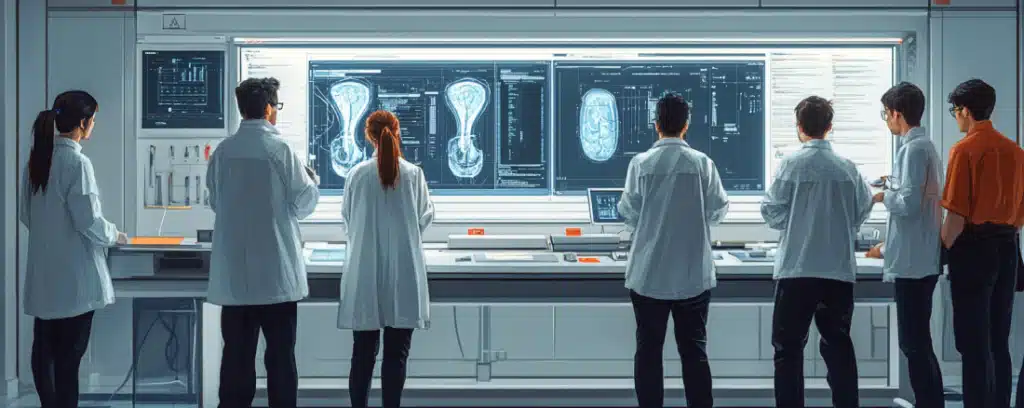The gaming industry continues to expand rapidly, generating billions in revenue each year and creating new career opportunities for skilled developers. As video games become more complex and immersive, companies are increasingly seeking professionals with both technical expertise and creative vision.
Earning a game development degree can provide students with the essential skills needed to thrive in this growing field. These programs often combine programming, design, and storytelling to prepare graduates for roles in game studios, indie development, or even virtual reality (VR) and augmented reality (AR) projects.
This guide will explore what a game development degree entails, alternative education paths for aspiring developers, and insights into salary trends and career opportunities in the industry.
What Is a Game Development Degree?
A game development degree is a specialized academic program designed to teach students the technical and creative skills needed to design, develop, and optimize interactive experiences. These programs blend computer science principles with artistic design concepts to prepare graduates for careers in the gaming industry.
Common degree titles for game development programs include:
Bachelor of Science (BS) in Game Development
- Example Program: DigiPen Institute of Technology – BS in Computer Science in Real-Time Interactive Simulation
Bachelor of Arts (BA) in Interactive Design and Game Development
- Example Program: Savannah College of Art and Design (SCAD) – BA in Interactive Design and Game Development
Master of Science (MS) in Computer Science (Game Development)
- Example Program: University of Southern California (USC) – MS in Computer Science (Game Development)
Bachelor of Science (BS) in Computer Science with a Game Development Track
- Example Program: Rochester Institute of Technology (RIT) – BS in Computer Science with Game Development Option
Students in these programs typically study subjects such as:
- Programming and Coding – Mastering languages like C++, C#, and Python to build game mechanics and interactive features.
- 3D Modeling and Animation – Creating lifelike characters, environments, and visual effects.
- Game Engine Technologies – Learning to develop games using popular platforms such as Unity and Unreal Engine.
- Level Design and World Building – Designing immersive gaming environments that enhance storytelling and gameplay.
- Artificial Intelligence for Games – Developing intelligent NPC behavior, enemy interactions, and adaptive game systems.
This combination of technical training and creative development equips graduates with the skills needed to build engaging, innovative games for various platforms.
Alternative Education Paths in Game Development
While earning a game development degree provides a structured learning experience, alternative education paths can also help aspiring developers build essential skills and gain industry experience. These options are often flexible, affordable, and designed to teach practical skills through hands-on projects.
Coding Bootcamps
Coding bootcamps offer intensive, fast-paced programs that focus on game development fundamentals. These programs are ideal for career changers or those seeking to build skills quickly.
- Example Program: GameDevHQ – Game Development Bootcamp
Online Courses and Certifications
Online learning platforms provide self-paced courses and certifications that allow students to develop game development skills independently.
- Example Program: Udemy – Complete C# Unity Game Developer 3D
Self-Taught Learning
Many successful game developers have learned independently through online tutorials, open-source resources, and community-driven platforms.
Popular resources for self-taught learning include:
- YouTube tutorials – Step-by-step guides for building games in Unity, Unreal Engine, and Godot.
- GitHub projects – Access to open-source game development projects for hands-on practice.
- Community-driven forums – Platforms like Reddit, Stack Overflow, and Discord provide collaborative learning spaces for developers to share knowledge.
Portfolio Development
Regardless of the education path you choose, building a strong portfolio is essential for showcasing your skills to potential employers. Personal projects, modding existing games, and participating in game jams can provide valuable experience and help your portfolio stand out.
Alternative education paths can be highly effective for motivated learners seeking flexible and cost-effective ways to enter the game development industry.
Key Skills for Game Developers
Successful game developers possess a combination of technical expertise, creative abilities, and problem-solving skills. Key skills commonly developed through game development degree programs or alternative education paths include:
- Programming Languages: Proficiency in languages such as C++, C#, Python, and JavaScript is essential for building game mechanics, AI behavior, and interactive systems.
- Game Engines: Mastery of platforms like Unity, Unreal Engine, or Godot is crucial for developing 2D and 3D games across various platforms.
- Art and Animation Tools: Familiarity with software such as Blender, Maya, and Adobe Creative Suite helps developers create realistic characters, animations, and environments.
- Problem-Solving and Critical Thinking: Game developers often encounter complex technical challenges, requiring strong debugging skills and creative problem-solving to ensure smooth gameplay.
- Storytelling and Narrative Design: Developing immersive experiences often involves crafting engaging storylines, character development, and dialogue to enhance player engagement.
Combining these skills allows game developers to contribute to all aspects of game creation, from coding and design to testing and deployment.
Game Developer Salary and Career Outlook
The gaming industry offers a variety of career opportunities, with salaries varying based on role, experience, and location. According to the U.S. Bureau of Labor Statistics (BLS), relevant roles and their median annual wages as of May 2023 include:
- Software Developers: Responsible for designing, coding, and testing software applications, including video games. The median annual wage for software developers was $132,270.
- Special Effects Artists and Animators: Create visual effects and animations for various media, including video games. The median annual wage for special effects artists and animators was $99,060.
- Software Quality Assurance Analysts and Testers: Identify problems with applications or programs and report defects. The median annual wage for software quality assurance analysts and testers was $101,800.
Factors Influencing Salary Potential
Several factors can impact earning potential in game development roles:
- Experience and Portfolio Quality: Developers with extensive project experience and strong portfolios often command higher salaries.
- Specialized Skills: Expertise in emerging areas such as virtual reality (VR), augmented reality (AR), or artificial intelligence (AI) can increase job opportunities and salary potential.
- Location and Industry Demand: Game development hubs such as Seattle, Los Angeles, and Austin offer higher salaries due to a strong industry presence and increased demand for talent.
Game developers with a combination of technical expertise, creative skills, and industry experience are well-positioned to secure rewarding roles in this rapidly expanding field.
Choosing Between a Degree and Alternative Learning Paths
Deciding between a game development degree and alternative education paths depends on your career goals, learning style, and timeline. Each option offers distinct advantages:
When a Game Development Degree Is the Right Choice
A formal game development degree may be the best option for students who:
- Prefer a structured curriculum that guides them through core concepts, technical skills, and creative design principles.
- Seek access to resources such as dedicated game labs, mentorship from experienced faculty, and career services support.
- Want opportunities to participate in internships, research projects, or industry partnerships to gain practical experience before graduation.
- Plan to pursue advanced roles in established game studios or technology companies where a degree may be required or preferred.
When Alternative Learning Paths Are Suitable
Alternative learning paths may be ideal for individuals who:
- Are self-motivated learners or career changers seeking a faster, more flexible way to enter the industry.
- Prefer hands-on, project-based learning that emphasizes building a strong portfolio.
- Are interested in learning specific skills, such as programming in Unity or designing 3D assets, without committing to a multi-year degree program.
- Want to reduce costs by utilizing affordable or free resources such as coding bootcamps, online courses, and community-driven platforms.
Both paths can lead to successful careers in game development. Choosing the best option depends on your individual learning preferences, career objectives, and available resources.
Frequently Asked Questions (FAQ)
What is a game development degree?
A game development degree is an academic program that teaches students the technical, artistic, and design skills needed to create video games. These programs often combine coursework in programming, computer science, and creative storytelling to prepare graduates for roles in game design, development, and related industries.
Is a game development degree required to become a game developer?
No, a game development degree is not strictly required to become a game developer. While a formal degree can provide structured learning and access to valuable resources, many developers enter the industry through alternative education paths such as coding bootcamps, online courses, or self-taught learning. A strong portfolio demonstrating technical and creative skills is often the most important factor in securing a role.
Can you learn game development without a formal degree?
Yes, many successful game developers have learned through self-study, coding bootcamps, and online resources. Platforms such as Udemy, Coursera, and YouTube offer comprehensive tutorials and project-based learning experiences. Building a strong portfolio through personal projects, modding, or game jams can demonstrate your skills to potential employers.
What’s the difference between game design and game development?
Game design focuses on creating gameplay concepts, storylines, and player experiences. Game developers, on the other hand, focus on the technical aspects of building the game, including coding, engine development, and system optimization. While the two roles often overlap, designers emphasize creativity and narrative, while developers focus on technical execution.
Exploring Your Path in Game Development
Whether you pursue a game development degree or take an alternative learning path, gaining practical experience and building a strong portfolio is key to breaking into the industry. By combining technical skills with creative thinking, aspiring developers can find rewarding opportunities in this growing field. Evaluating your goals, preferred learning style, and available resources can help you choose the path that best aligns with your career ambitions.



